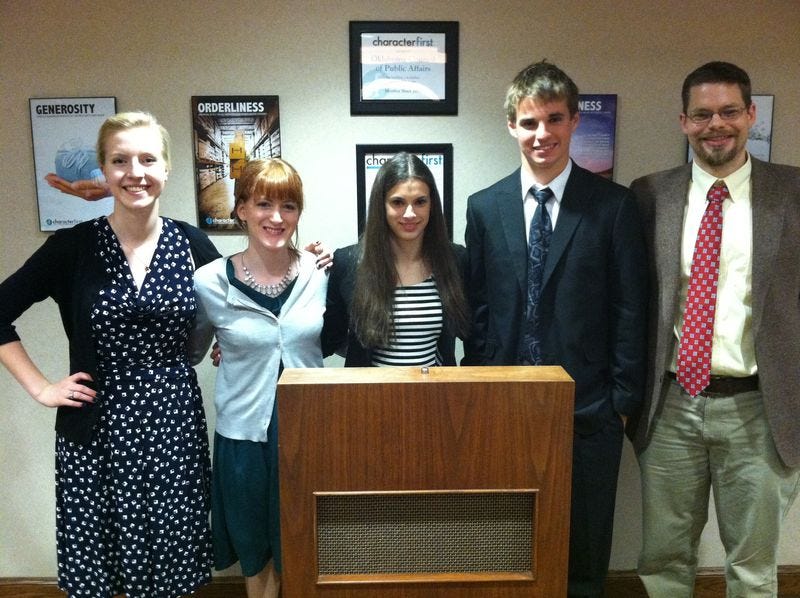The Classical Capstone

"A well-spent day brings happy sleep." Leonardo da Vinci
"At this I awoke and looked, and my sleep was pleasant to me." Jeremiah 31:26
I slept well last night, not because I was tired (I was), nor because all's right with the world (it isn't). I slept well last night because I had just witnessed truth, goodness, and beauty at work, and it was comforting.
Last night, I (along with four other teachers - Abby Lorenc, Alex Kelley, Josh Spears, and Todd Wedel - and four sets of super-supportive senior parents) had the privilege of hearing from our four seniors - Sarah Baskerville, Ruth Serven, Mackenzie Valentin, and Austin Clark. Each presented what we're calling our Classical Capstone - a 25-minute speech followed by a 10-minute question and answer period, during which the student fields questions from parents and faculty advisors concerning what he or she has just presented. In addition to the presentation, students have the opportunity to create something that goes along with the topic discussed.
As the Capstone is a year-long project, Academic Dean Todd Wedel put together a 35-page booklet detailing the initiative's requirements. Here's the overview paragraph:
The Classical Capstone is the culmination of the Classical and Christian education at Veritas. Through the process of developing their Classical Capstones, students will be required to determine a topic of interest to themselves, formulate a driving question or concern, conduct background research, take a position, motivate the position or concern to their audience, work through drafting the Classical Capstone, publicly present the Capstone Project and answer questions from the audience, defend their project during a formal examination, and reflect up on what they have learned about the learning process, themselves, and a Christian worldview through the various stages of the Classical Capstone.
The project is designed to encompass the students' classical Christian education:
The Classical Capstone will demand that students demonstrate all the elements of a truly classical education, familiarizing themselves with the grammar of their topic or subject, determining the connections between/among viewpoints/sources/positions/expressions, and expressing their viewpoint cogently, clearly, and winsomely. The Classical Capstone will demand, as well, that the entirety of the Project is imbued with a Christian worldview, from the way students select an appropriate topic, to the way they conduct research, to the type of argument or position they formulate, to the way they express their position, to the way they respond to questions and challenges.
So that students avoid becoming overwhelmed or lost in the process, they are able to choose a faculty advisor to walk through the year with them:
Students will work with a Faculty Advisor during the course of their Project in conjunction with the Classical Capstone Director. The Faculty Advisor will help with the selection and narrowing of topic/focus, aid in direction of research, aid in the formulation of appropriate argument, and serve as one of the members of the examination panel.
Finally, when all's said and done (as it was last night), there are "deliverables":
Although the most common form of the Classical Capstone’s final deliverable will be a paper, students are not limited to this form. Other forms of rhetoric-level instruction are acceptable and encouraged if they comport with students’ natural gifts and abilities. The scope of the project will still involve background research and may require written work even if the final deliverable is not written (e.g. a student may need to write an analysis and defense of a painting or musical composition). Deliverables will be evaluated on their ability to demonstrate standards of biblical aesthetics including order, balance, harmony, unity-in-diversity, etc.
I'm not sure I can think of a better way to invest two hours. Our students presented very thoughtful and well-written papers on the topics of our human need for art, what good art is and should be, how our relationship to food has everything to do with our relationship to others, and (just for fun), an in-depth analysis of William the Conqueror and the Battle of Hastings in 1066.
As Mackenzie's presentation involved a study of journal-making, she made two beautiful leather-bound journals - one with paper she bought, another with paper she made out of (I'm not kidding here) old jeans. Ruth, having talked about art more literarily, brought copies of an original short story heart-wrenching in its description of two boys caught between dysfunctional parents called "The Tree".
Sarah, advocating for a cultural return to "cuisine" (and not just "cooking"), baked amazing homemade pumpkin muffins using her own recipe for everyone in attendance. And Austin had obviously invested his "project" time in a ton of extra reading and research, as evidenced by his phenomenal grasp of the complexities of the Normans and Saxons during his Q&A time.
With only a month of school left (and a thousand thoughts having to do with it running through my mind), it was nice to sit back and witness why it's all worth it. Last night was a celebration of our seniors' hard work and accomplished rhetorical gifts which served to reaffirm the trivium as a tried and true educational methodology. In addition, seeing their desires (and not just their words) shaped by education that is truly Christian was inspiring.
Make no mistake, their grasp - like mine - of the nuances of life is far from perfect and still developing (some of the parents' careful but challenging questions spoke to this). But, it is being shaped and redeemed by the truth, goodness, and beauty of the Gospel, reminding me of Philippians 1:6, that He who began a good work in these students will bring it to completion at the day of Christ.
I'm not sure there's a more comforting thought with which to hit the hay.



